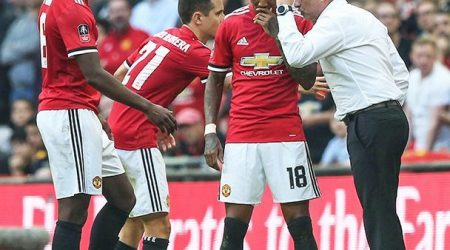8:02 am | November 7, 2018 | Go to Source | Author:
There is an old saying about how it does no good to water last year’s crops but, well, come on.
With Mourinho, the whole story is last year’s crops (and the year before that and the year before that). It is always the same with him, always the tale we have heard before. The twists and turns of Mourinho’s major coaching stops are soccer’s version of a horror-movie franchise: Yes, sure, this time it might be “Halloween” night instead of “Friday the 13th” but everyone knows where this is headed. At some point — and probably pretty soon — we’re getting to the screaming.
Before the screaming, though, comes the swell. And while Mourinho’s detractors may balk at admitting it, Mourinho’s rise is undeniably extraordinary.
Think about it: Growing up in Setubal, Portugual, Mourinho worships his father, who is a footballer, but young Jose is a middling talent, and his mother wants him to go to business school anyway. Mourinho loves sports, however, and he becomes a physical education teacher and local coach whose big break arrives in 1992 when Sir Bobby Robson, the English star, takes a coaching job at a Portuguese club and needs an interpreter.
Mourinho, a polyglot, gets the gig. He learns under Robson in Portugal, and stays with him when Robson moves on to Barcelona. When Robson then leaves Barcelona, Mourinho remains at the Catalan club under Louis van Gaal, the Dutch master. In 2000, Mourinho returns to Portugal and by 2002, he is leading Porto.
There, he stuns the world by winning a UEFA Cup in 2003 and, even more exceptionally, a Champions League title in 2004, upending the continental aristocracy by taking a Portuguese team straight through the stalwarts from England and Spain and Germany and France. At just 41, Mourinho is pure Hollywood — rakish style, sharp wit, smoldering gaze — and his approach is revolutionary. His tactics are renowned.
“He made you want to run through walls for him because he was so good,” says Benni McCarthy, a striker under Mourinho at Porto. “I remember he came to my room the night before we played Manchester United in the Champions League and he told me, ‘I know your hold-up play is very good. But for this game, against Gary Neville and Wes Brown, you have to come short and spin behind because they hate to run toward their own goal.'”
McCarthy laughs. “I scored two goals, and after the second, I went to the sideline and he said, ‘Did you have a crappy game?’ I asked him, ‘How did you know?’ and he just hugged me and said, ‘It’s my job.'”
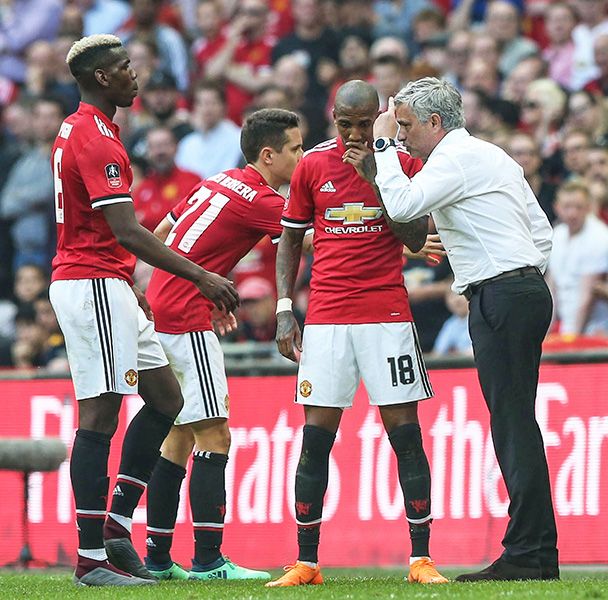
Nowhere is Jose Mourinho’s stress more obvious than in his relationship with Paul Pogba, left. Their feuding has been a significant distraction this season. John Peters/Man Utd/Getty Images
Mourinho’s overarching strategy, from the very beginning, has been to make the other team uncomfortable. Refusing to follow the traditional path of drilling his players on offensive schemes, Mourinho makes it his mission to dominate the game by thwarting whatever it is that his opponent is trying to do. Instead of engaging in a 90-minute duel, with thrusts intended to score, Mourinho’s aim is to lean on the other team’s throat until, slowly but surely, the foe suffocates.
“He was a coach at that time that was probably a little bit ahead of the rest,” says Steve Clarke, who worked under Mourinho at Chelsea.
Mourinho’s strategies work, too. He goes from Porto to Chelsea in 2004, where he takes a team that hasn’t won a top-division title in a half-century and wins the Premier League in his first year, setting a record for fewest goals allowed in a single season. At Inter Milan, he wins two league titles and another Champions League. At Real Madrid, he delivers the club’s first Copa del Rey trophy in 18 years, wins the Spanish league title, reaches the Champions League semifinals and becomes the first manager in history to win league, cup, super cup and league cup titles in four different European countries.
“He loves a team that is well organized,” says Ricardo Carvalho, who played for Mourinho at three different clubs. “That is what I will always remember from him, the way he would shout at us to make sure there were no gaps.”
It is a staggering run of success, and while other coaches have won more titles, shouldn’t there be a premium placed on those who step into the world’s game and win across borders?
Early and midcareer Mourinho does that. He wins. A lot. Simultaneously, he embraces the role of soccer’s rogue, a pithy and provocative figure who revels equally in being both a prodigy and a charlatan.
He loves being known as the “Special One,” calls Arsenal manager Arsene Wenger a “specialist in failure” and says young players “are like melons — only when you open and taste the melon are you 100 percent sure that the melon is good.”
He bemoans certain players who have “Rastafarian” haircuts, suggests George Clooney should play him in a movie, speculates that God “must really think I’m a great guy,” says real pressure is “bird flu … It’s not fun and I’m more scared of it than football,” and, in one particularly abstract monologue, explains that his injury-riddled but highly paid team is “like having a blanket that is too small for the bed. You pull the blanket up to keep your chest warm and your feet stick out. I cannot buy a bigger blanket because the supermarket is closed. But the blanket is made of cashmere.”
Mourinho also demands unflinching control. His scouting reports for each game are so thick that, according to one former player, “they can’t even fit under the seat of the car” (which, it should be said, is where some less-analytically inclined players toss them). He favors experienced players who are predictable over young players who may have more upside but are erratic. He likes talented players who are not quite superstars because they are easier to bend to his will.
In short, Mourinho is — in the words of a former colleague — a “walking war zone.” And he wages battle constantly, reveling in the restorative quality of conflict even as, inevitably, it boils over.
Sometimes, the target is a rival coach (Wenger, Rafa Benitez). Sometimes it is his own team’s chairman (Roman Abramovich, Florentino Perez). Sometimes — more than sometimes, really — it is one of his players (Pedro Leon, Juan Mata, Iker Casillas, Kevin de Bruyne, Bastian Schweinsteiger — you get the idea).
With Casillas, a Spanish legend, Mourinho thinks the Madrid captain is disloyal for trying to broker a peace with Barcelona’s Xavi in the increasingly nasty Clasico feud. So Mourinho shouts at Casillas in front of his teammates and derisively refers to him only as “the goalkeeper” instead of using his name.
With Leon, Mourinho decides the player’s attitude is not suitably humble. So he berates Leon constantly, and according to a story in the Guardian, he once tells Leon that he would not play in the team’s next game even if the team plane crashed and everyone on board died.
Not surprisingly, this style is not for everyone. Mourinho hoped to someday manage Barcelona, where he had such a formative experience as a young coach, but in 2008, when the Catalan club has a coveted opening, it hires Guardiola over Mourinho.
It is a straightforward decision, and the rationale is clear. Ferran Soriano, who is a top executive at Barcelona during that period, explains the club’s choice this way in Diego Torres’s book on Mourinho, “The Special One”: “Mourinho is a winner,” Soriano says, “but in order to win he generates a level of tension that becomes a problem. It is a problem he chooses… [and] we didn’t want it.”
It is a problem he chooses.
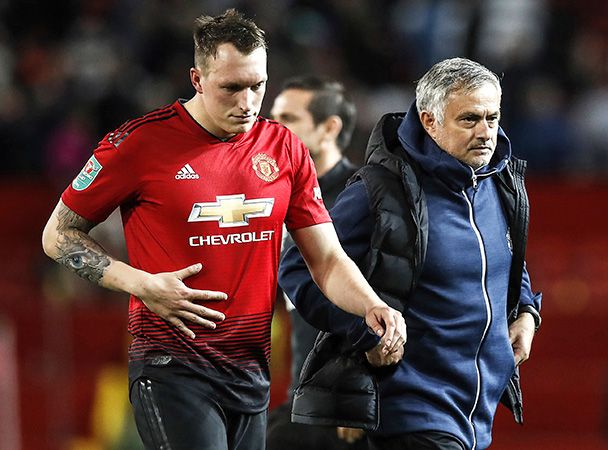
The way Jose Mourinho treated Phil Jones, left, after their Carabao Cup defeat vs. Derby was beyond his usual manner of publicly criticizing his players. Martin Rickett/PA Wire/AP Photo
Almost to a man, those who know Mourinho say the change in him begins during the meltdown in Madrid and crystalizes during the second spell at Chelsea, a transformation so noticeable that, in the words of one former player, the current version of Mourinho is “not the coach I played for.”
What shifts? Well, everything and nothing. In May of 2012, two weeks after winning La Liga with Real Madrid, Mourinho signs a four-year contract extension and is hailed as the future of the Spanish giants — only to flame out spectacularly, as he clashes with Casillas and Sergio Ramos, seethes over the lionization of Guardiola and Barcelona and rages against his boss, Perez. He even goes after his star, Cristiano Ronaldo, who is 27 and in his prime, saying Ronaldo “maybe thinks that he knows everything and the coach cannot improve him anymore.”
Within a year, Mourinho is gone but quickly resurfaces for a second run at Chelsea, where he somehow amps up the acrimony even more. There is some decent success (a league title in his second season), but it is undermined by an endless string of erratic behavior which runs the gamut from paranoid complaining about referees to alleged sexual discrimination in 2015, when Chelsea’s team doctor, Eva Carneiro, claims Mourinho calls her a “daughter of a whore” after she runs on to the field to treat an injured Chelsea player without consulting him. The case is settled, but it remains a central example of what those around Mourinho see as an increasing — and disturbing — focus on blame.
Consider: A week after the Carneiro episode, Mourinho stuns the dressing room by substituting Terry, the longtime central defender and a perpetual 90-minute player, at halftime of a game: a move that, one longtime Chelsea staffer says, feels like “Jose can’t fight with the doctor so he’s going to fight with the captain.”
A clash with a team leader. Lashing out at club staff. A rift with the team’s young superstar (this time it is Eden Hazard). Mourinho’s defensiveness becomes so consuming that he begins demanding copy approval for any kind of content about the team posted on Chelsea’s web site.
In 2016, Mourinho signs a contract extension with Chelsea but — stop me if you’ve heard this before — leaves the club just months later, the wreckage of his final stretch stacked atop the shrapnel he produced in Madrid.
“Jose, he is used to winning,” Carvalho says. “And when he doesn’t win, it gets a little more difficult to live with that.”
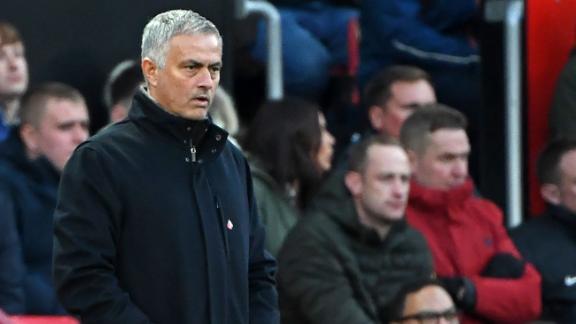
The FC crew raise questions about whether Jose Mourinho can be trusted with 100 million pounds to spend on Manchester United reinforcements in January.
And yet, still: it can’t be as simple as losing, can it?
Can it?
Managing Manchester United is supposed to be a rebirth for Mourinho, who takes over in 2016 and inherits a club that has been (relatively) languishing since Alex Ferguson’s retirement, wandering through the morass that was the stewardships of David Moyes and Louis van Gaal. Mourinho, once the genius, is supposed to transform United back into the princes of the game.
It doesn’t happen. United wins the second-tier Europa League in Mourinho’s first season, which is nice, sure, but feels like a consolation prize and was more dramatic when Mourinho did it with a team like Porto.
Then last season, United finishes second in the Premier League, loses in the FA Cup final and is knocked out of the Champions League in the Round of 16, a drab showing made worse by the impatience of United fans who yearn for the days of attacking and incisive football of Ferguson’s day and are unmoved by Mourinho’s tight, scripted, stage-managed productions that increasingly seem to end in draws. His players grumble about that, too. This fall, the disappointing results pile up, Mourinho’s desolation — and isolation — crests.
Off the field, Mourinho draws even deeper into himself. Faria is gone and Mourinho’s existence at the Lowry, with his family several hundred miles away, drags on. Even in a spacious River Suite, the walls of any hotel will close in, and as happens with many who spend time alone, Mourinho’s list of grievances with the world grows longer.
It is like counting snowflakes in a blizzard: Referees are against him. Opposing coaches are naive or petulant. The players’ national teams are not respectful of a club’s needs. During a game against Wolves at Old Trafford, Mourinho upbraids a paramedic sitting behind the United bench because the young man tosses a ball that has gone out of bounds directly to a player instead of giving it to Mourinho. Even traffic becomes a problem; twice, the team bus is delayed arriving at matches because of heavy backups on the way to the stadium.
During one of the gridlock episodes, Mourinho actually puts up his hood and walks the final stretch to the stadium instead of sitting on the bus with his players — a remarkable feat, both for its novelty and the way it allows Mourinho to become a metaphor for himself. “No one recognized me,” he says afterward.
Theories abound on what has led Mourinho to this point, and one — offered by a friend of Mourinho’s, it should be said — is that much of it leads back to Guardiola.
This theory, the friend says, is rooted in the idea that Mourinho, despite his success, has actually been incredibly unlucky during his career.
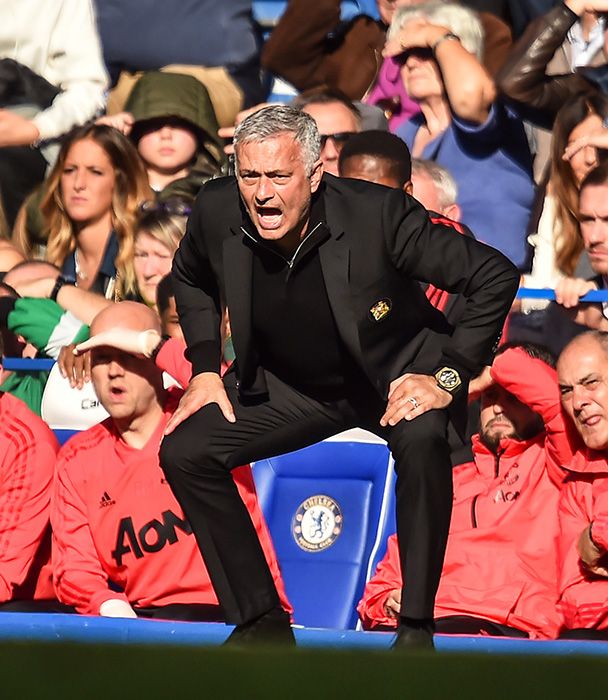
One theory about Jose Mourinho’s mood is that he’s been exceptionally unlucky to manage big clubs at a time when Pep Guardiola was having success in the same leagues. Glyn Kirk/AFP/Getty Images
Strange as that might seem, think of it this way: Mourinho has been blessed to have two of world soccer’s dream jobs — Real Madrid and Manchester United — and in both cases ends up with them at perhaps the worst time possible, in large part because of Guardiola.
In the first instance, Mourinho joins Madrid at the height of its crisis period, an era exacerbated by the fact that Guardiola and Barcelona are so innovative and dominant that some regard them as the best in the sport’s history. Then, with United, Mourinho takes over the team while it is in the throes of incoherence (despite having previously had decades of sustained excellence) and it is, again, against Guardiola, who this time is at Manchester City, a historically awful club that has suddenly morphed into a powerhouse.
At City, Guardiola has Middle Eastern royalty ownership, endless resources and a business model that is the definition of a modern, progressive football club. At United, traditionally the alpha of Manchester, Mourinho is literally walking to the stadium by himself.
There is no modern football operations department at United, no widespread analytics or forward-thinking data team. There is only a chairman, Ed Woodward, who is a businessman and not a sports executive. United is, in many ways, the same club it was under Ferguson, who retired in 2013.
“The structure is not right for Jose,” Mourinho’s close friend says. “So he feels attacked. And when Jose feels attacked, he puts his fists up. That is what is happening — he is walking around with his fists up all the time at Manchester.”
It is, to be sure, a sympathetic theory to Mourinho, but it plays to the idea that Mourinho, forever the war-maker, now feels under constant attack: His tactics, once revolutionary, are more common. His motivational techniques, once impenetrable, do not resonate with this generation of young players in the same way. Everyone has dossiers on the opponent now, and the modern player wants to express himself on the field, wants to run freely and create, wants to be built up.
Pogba and stars of his generation do not want to be directed as if they are puppets, yet Mourinho still wants to pull the strings. That he can’t has left him with a perpetual pall, a relentless resentment that injects every aspect of his job.
“He’s gone from being a ball of energy on the touchline, someone everyone wanted to see and watch because he was so engaging, to this person — this face — that has so much misery all over it,” a former colleague of Mourinho’s says. “And I think the players and fans pick up on that. How can they not?”
Powered by WPeMatico


